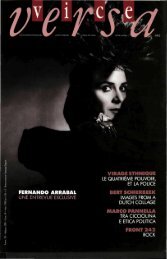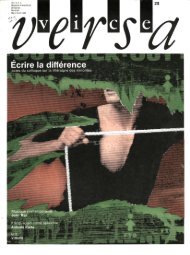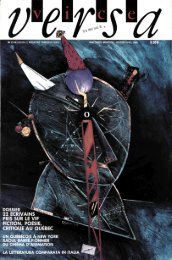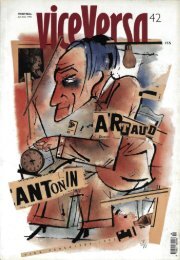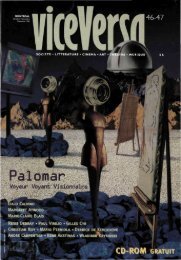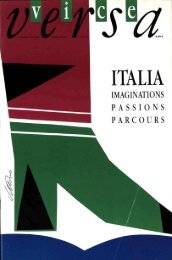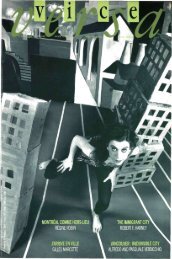Three i - ViceVersaMag
Three i - ViceVersaMag
Three i - ViceVersaMag
You also want an ePaper? Increase the reach of your titles
YUMPU automatically turns print PDFs into web optimized ePapers that Google loves.
makes him even more hideous. The young<br />
man stammers out paltry excuses, pretexting<br />
it was all down to his editor, that he<br />
too hadn't understood. Besides, nobody<br />
had a clue about this damned business.<br />
Nobody except he and Nathaniel Haag,<br />
eminent socio-psychologist, whose recent<br />
book confirmed what he, Desire Ladouceur,<br />
had known from the start.<br />
"The Killing Singularities", it is true,<br />
had been a real letdown for the North<br />
American criminologists. Drawing on<br />
anthropology, history and psychoanalysis<br />
Haag maintained that the series of unexplained<br />
murders which were occurring in<br />
the cities had something of the nature of a<br />
new form of ritual criminality. He claimed<br />
that by applying his method one could reasonably<br />
anticipate the date and place<br />
they'd be carried out. This declaration was<br />
laughable at first. But two days after the<br />
Huntington Avenue drama it set people on<br />
edge. The police questioned Haag for eight<br />
hours. His Washington Square apartment<br />
was searched from top to bottom. In<br />
between time, he became a celebrity with a<br />
reputation for being provocative.<br />
The gutter press revealed his fondness<br />
for young boys. A rumor persisted that<br />
credited him with crimes he would have<br />
staged in order to confirm his theory. A letter<br />
from his faculty dean arrived, warning<br />
him against any further scandal. In short,<br />
the private and professional life of<br />
Nathaniel F. Haag was turned upside down<br />
in a manner far beyond anything he could<br />
have dreamed. Yet what disturbed him<br />
most was that, despite his achievements,<br />
none of his peers had considered it advisable<br />
to confirm or invalidate his hypotheses.<br />
As if he had unveiled a secret everyone<br />
knew about but were unwilling to acknowledge.<br />
Nobody was really interested in these<br />
theories except this puny reporter, uglier<br />
than himself, who wrote for a some small<br />
paper on the outskirts of Montreal and was<br />
in New York with the sole purpose of meeting<br />
him.<br />
They have just left Times Square and<br />
entered an heavily-lit zone. Red and<br />
mauve neon lighting intermittently claw<br />
the leprous facades of shops with shoddy<br />
goods. Above them, a pulsing mauve beam<br />
comes out of the windows, punctuated by<br />
the stroboscope of a disco. One would like<br />
to caricature diis city that we wouldn't<br />
otherwise have caught out. Two men of<br />
medium height, who look like brothers,<br />
leave a cabaret. They both have moustaches<br />
and wear iridescent shirts under their<br />
leather jackets. Their gaze lingers at length<br />
on Haag and Désiré and the bum of their<br />
prying eyes is felt long after they've gone.<br />
Haag, in turn, looks mockingly at Désiré,<br />
and invites him to a café.<br />
Désiré flatly refuses explaining, in the<br />
most serious manner possible, that he hasn't<br />
'come for that' but to accomplish a mission<br />
of a higher order in which he, Haag, is<br />
the striking and indispensable element.<br />
Haag looks to the sky, as if trying to find<br />
words which are going to resolve the situation.<br />
After a moment he speaks to him as if<br />
they've suddenly become intimate friends:<br />
But you're not afraid, in fact. Who says<br />
I'm not the killer.<br />
Desire's eyes shine with a strange<br />
gleam "I know who the killer is."<br />
... Moira and Désiré<br />
Moira waited for Désiré to finish his<br />
tale. She had her nose pressed against the<br />
Altitude restaurant's panoramic window.<br />
Her breath, condensating on the cold<br />
pane, formed a mist in which she could see<br />
the lights of Montreal reflected.<br />
Without admitting it to herself perhaps,<br />
this story attracted her already with<br />
its violence and mystery. Like the pure<br />
black quartz of Mount Royal standing out<br />
against the luminous pearly line of the<br />
horizon. This block which sucked in all the<br />
brightness, keeping captive something<br />
unspeakable which committed evil. Maybe<br />
that was what had drawn her closer to<br />
Désiré and made her decide to trust him<br />
again with the investigation.<br />
She bent her neck forward and bit her<br />
upper lip, its fullness. She turned round.<br />
"You really believe in these théories?" she<br />
said. Désiré smiled, wanted to take Moira's<br />
hands, but she slipped away. She was<br />
already rummaging in her purse to hand<br />
him the paper. Désiré half-grimaced; it<br />
hadn't been published. Willie too had<br />
given in. Deep down, that didn't surprise<br />
him. Moira seemed relieved.<br />
Perhaps she also thought he exaggerated.<br />
Perhaps she began to be afraid of him<br />
too.<br />
Moira rrt} sweet little lamb, come here,<br />
come, I won't hurt you. You smell of lilac.<br />
Come with me into the shadow flecked light.<br />
"It 's him isn't it. He set you against<br />
me." He said. Moira looked at him, surprised.<br />
Once again Désiré had become<br />
caught up in his phobias. He created imaginary<br />
lovers for her, accused her of feeling<br />
differently about him, of wanting to leave<br />
him whereas there was nothing between<br />
them. Their undertsanding was strictly<br />
VICE VERSA 52 35



